LGBTIQA at OU and in Michigan
- Introduction
- Amending the Student Equal Opportunity policy
- The amendment is adopted
- The GSA First Drag Show
- The Gender and Sexuality Center
- Michigan LGBT Organizations
Introduction
In the 1990s public universities in Michigan began amending their anti-discrimination policy for students to include sexual orientation.
When Oakland University students brought this issue to the attention of the administration the proposed amendment to the Student Equal Opportunity policy began a three year journey to approval.
This exhibit provides an overview of LGBTIQA history at OU, and an overview of some LGBT organizations in Michigan since the 1970s.
Credits
Research and text by Mary Catherine Moeller, Winter 2016
images courtesy of the Oakland Post
This exhibit was written as part of a Women and Gender Studies internship. It is intended to open doors for further research on LGBTIQA issue as Oakland University as well as the history of pride in Michigan.
The Drive to Amend the Student Equal Opportunity Policy
A notable and incredibly controversial time for the LGBTIQA community at OU began in the Fall of 1992. The Gay and Lesbian Alliance (GALA), ancestor to our campus’s current Gay/Straight Alliance (GSA), petitioned Student Congress to include sexual orientation in the Equal Opportunity Policy for students as a category to be protected from discrimination.
Of the 15 public universities in Michigan at the time, Oakland University was one of only 3 universities who did not have this sort of protection in place for students. This amendment had been made to the faculty bargaining agreement a few years prior and GALA believed that students deserved the same protection.
This petition passed from Student Congress to the Senate Human Relations Committee to the University Senate and then to the University Affairs Committee.
When this resolution came to the University Affairs Committee, a sub-group of the Board of Trustees, it stayed with the committee for over a year. The wait sparked an uproar in the student community. One particular student from GALA wrote a letter to the editor of the Oakland Post expressing her disgust with the Committee’s stall tactics. She felt that they were stalling because they did not want the University to be seen as pro-gay.
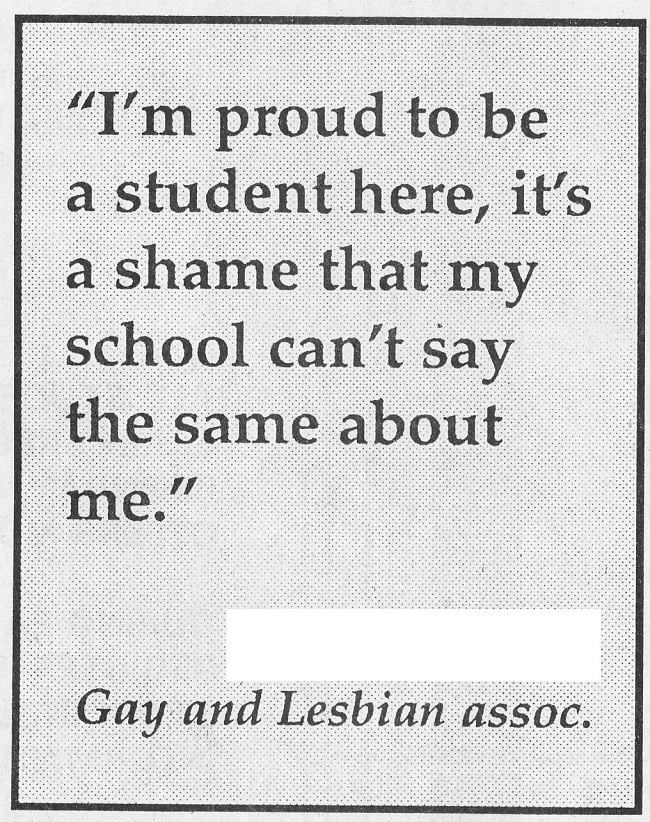
This letter was the catalyst for a 5 week stretch of letters to the editor from students of all different viewpoints. Students took sides both for and against this policy change and some very passionate letters to the editor were born from this. Some students pleaded with the University not to allow the change because they believed that this fed into perverted homosexual behavior. Allies of the LGBT community entreated the University Affairs Committee to make the change.
Finally, the same student from GALA wrote again expressing her dismay that even though her organization had taken all of the proper avenues to petition for an amendment, the Committee was continuing to ignore it. She concluded in her letter that if students wanted to make positive change for the LGBT community they were going to have to become louder and bolder. The student asked that her fellow students join with her in this fight for equality. GALA began lobbying for student support through events explaining the importance of the change.
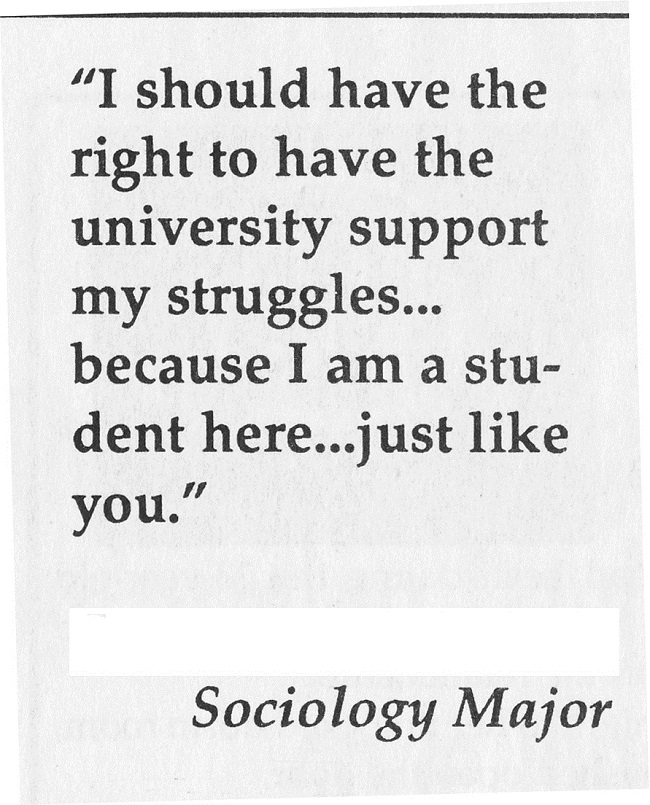
The Amendment Is Adopted
The University Affairs Committee finally brought the resolution to a vote at the Board of Trustees meeting on April 6th 1995. Only six of the eight Board members were present for the vote. Both students and faculty attended the meeting to speak for and against the amendment. The Board failed to pass the resolution with a vote of 3-3. They agreed that the resolution would come before the Board one more time in June of that same year.
This decision caused great distress for the members of GALA and their supporters. Supporters of the resolution has previously believed that this would pass the first time and, after the decision, believed that there was no hope for the June board meeting.
When the amendment came before the Board in June 1995, they had a more in-depth discussion about the amendment and why it was necessary. Student liaisons were present to speak in favor of the amendment and field questions from the Board about why this was an imperative change.
When the members of the Board took a roll call vote the decision was 5-2 in favor of passing the amendment to include sexual orientation in the Equal Opportunity Policy for students.
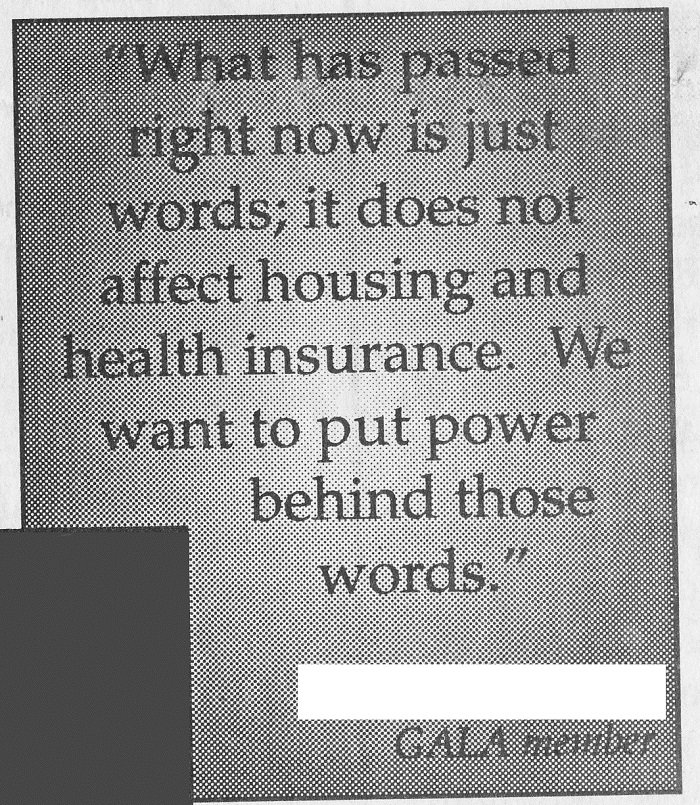
Members of GALA were incredibly happy when they found out, but were still critical that it did not pass the first time. While they believed that this was an important step, they expressed the need to continue working on bigger issues for the LGBT community in education.
The GSA First Drag Show
GALA reformed itself as the Pride Forum and then reformed again as The Gay/Straight Alliance (GSA) in 2004. The Gay/Straight Alliance aims to create a strong LGBTQIA community on campus by providing programming that brings together LGBTQIA students and allies.
The GSA held their very first Drag Show on April 1st 2004. The night involved student performances, including Drag Queens and Drag Kings, as well as professional performances. All $409 in tips given to performers were donated to Affirmations and the Triangle Foundation.
The GSA has held this event during Oakland’s Pride Week every year since, always including a variety of talents from students and professionals. This event brings in a diverse population of students and community members and raises money for local LGBT organizations.
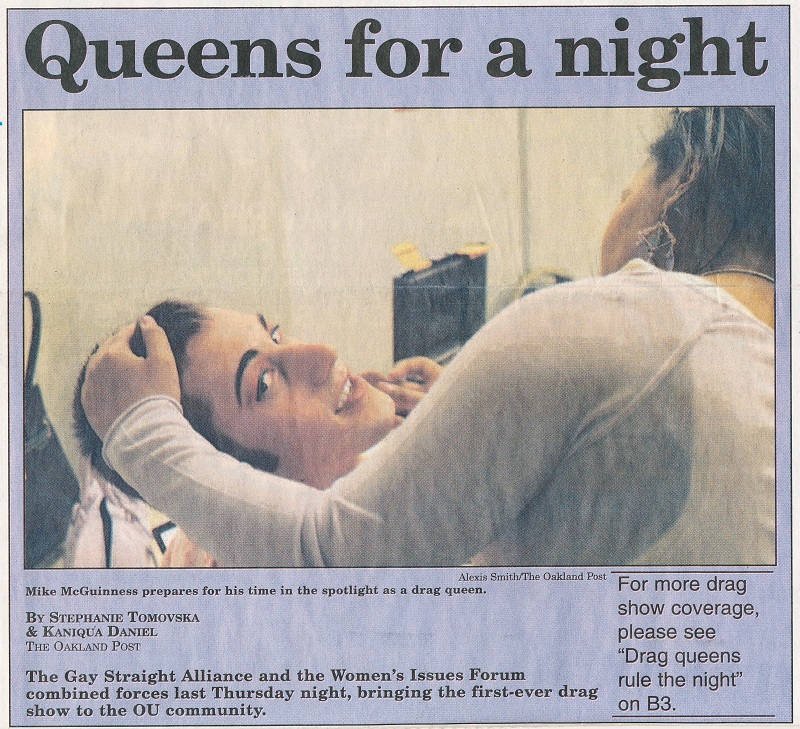

The Gender and Sexuality Center
In the winter semester of 2004, students began lobbying for a place on campus specifically dedicated to issues of gender and sexuality. Students letters and the initiative of the Gay/Straight Alliance made this center a reality.
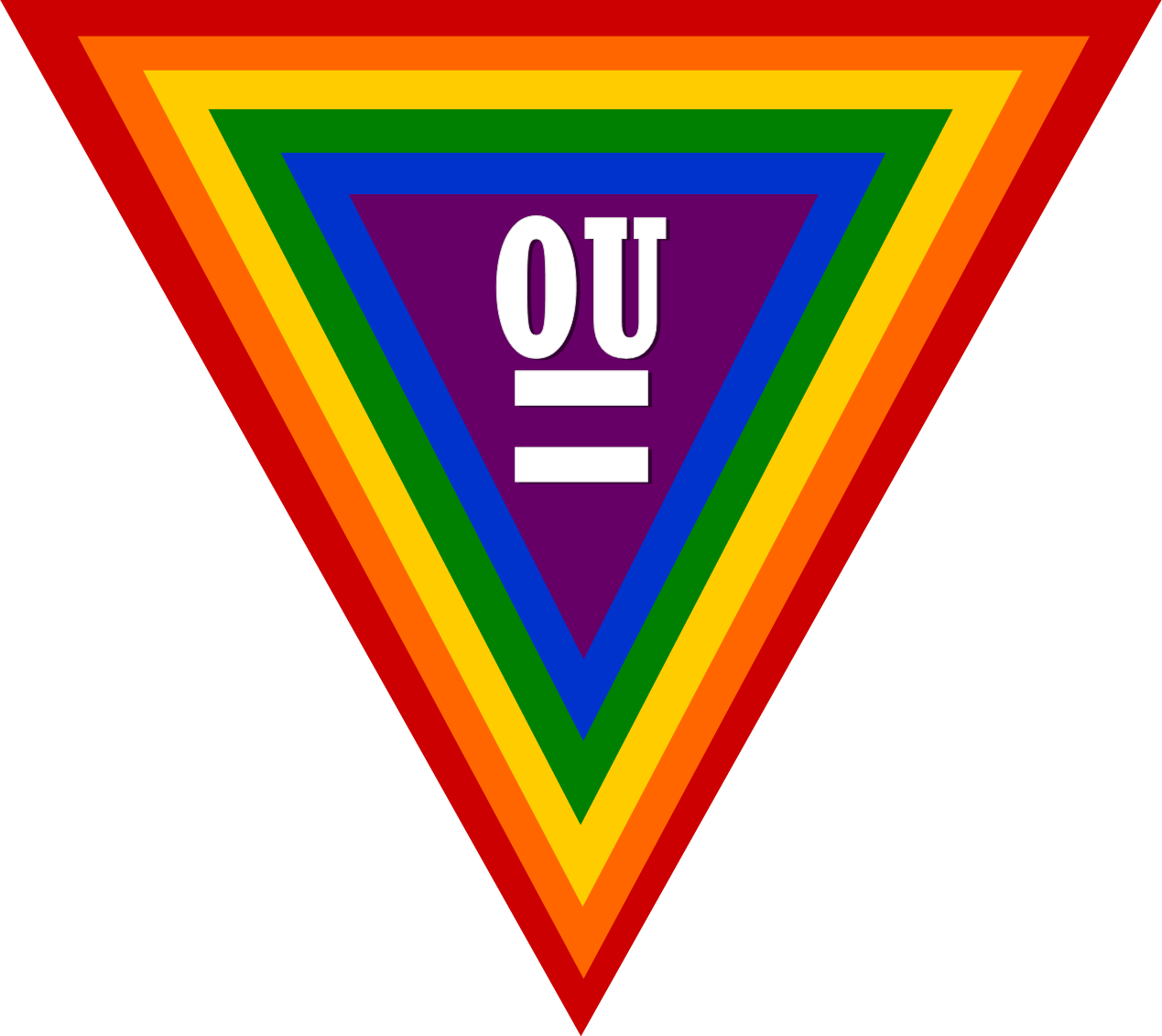
By October 11th 2005 the Gender and Sexuality Center opened its doors for the first time. Its goal was to connect organizations on campus that deal with gender and sexuality to form a community as well as provide resources to anyone on campus who is seeking information about gender and sexuality.
The GSC continues to provide this kind of support on campus and has also developed a SAFE training program to further grow the community of LGBTQIA allies on campus. This program educates individuals about issues affecting LGBTQIA people as well as resources available for this community. Being SAFE trained lets LGBTQIA individuals know that those with a placard bearing the symbol are allies.
Michigan LGBT Organizations
It is important to recognize the organizations that have helped organize the LGBT rights movement as well as provide resources to members of the community.
There are a variety of organizations based in Michigan that have been influential in the fight for equality for all sexual orientations since the hateful and violent demonstrations at the Stonewall Inn in Manhattan in June of 1969 helped propel the gay liberation movement to the forefront of public attention. This was the catalyst for the creation of many of the original Michigan gay pride organizations.
Some of the organizations have reformed and renamed themselves over the years, but the fight for equal treatment is still just as alive in each of the organizations.
This list highlights a few of the Michigan organizations whose materials can be found in the Robert Gaylor Collection in the University Libraries’ Special Collections.
Gay Liberation Front
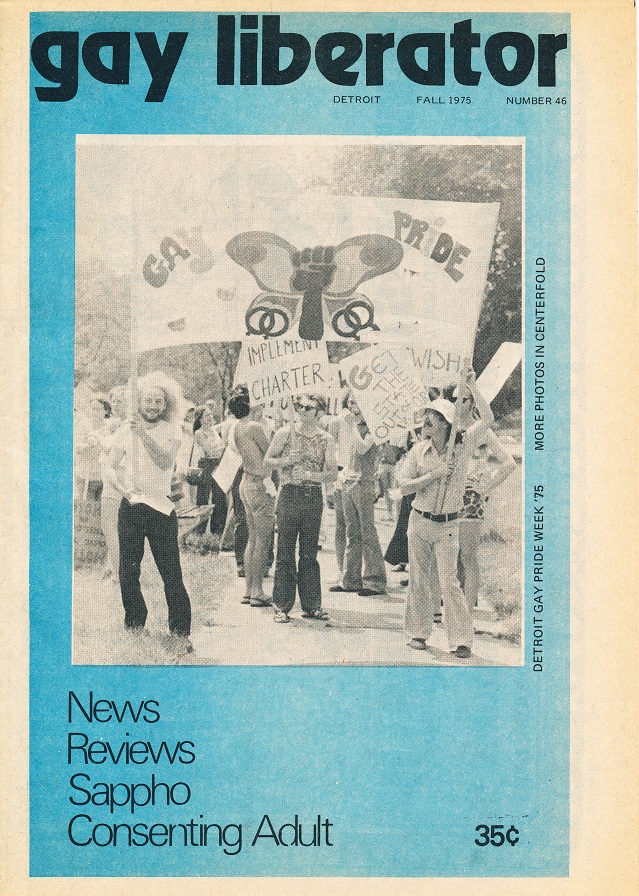 The Gay Liberation Front was founded in New York City in 1969 after the Stonewall riots. Chapters quickly began opening around the country with Michigan having one in Ann Arbor and another in Detroit. The Gay Liberation Front of Detroit began in 1970 to fight against compulsory heterosexuality and to transform the concept of the nuclear family to make our society more accepting of all sexualities.
The Gay Liberation Front was founded in New York City in 1969 after the Stonewall riots. Chapters quickly began opening around the country with Michigan having one in Ann Arbor and another in Detroit. The Gay Liberation Front of Detroit began in 1970 to fight against compulsory heterosexuality and to transform the concept of the nuclear family to make our society more accepting of all sexualities.
Gayor collection holdings: 1974-1976 issues of Gay Liberator, a magazine which emerged from the Gay Liberation Front.
Metropolitan Community Church of Detroit

The Metropolitan Community Church was founded in 1968 in Southern California and now has ministries all over the country. In Detroit, the Gay Christian Caucus that emerged from the Gay Liberation Front decided to affiliate with it in 1971. This church was founded as a ministry that is accepting of all sexualities and gender identities. They are based on what they call complete acceptance and the end of oppression in religion.
Gaylor collection holdings: issues of The Way, published by the Metropolitan Community Church of Detroit.
MOHR (Michigan Organization for Human Rights)
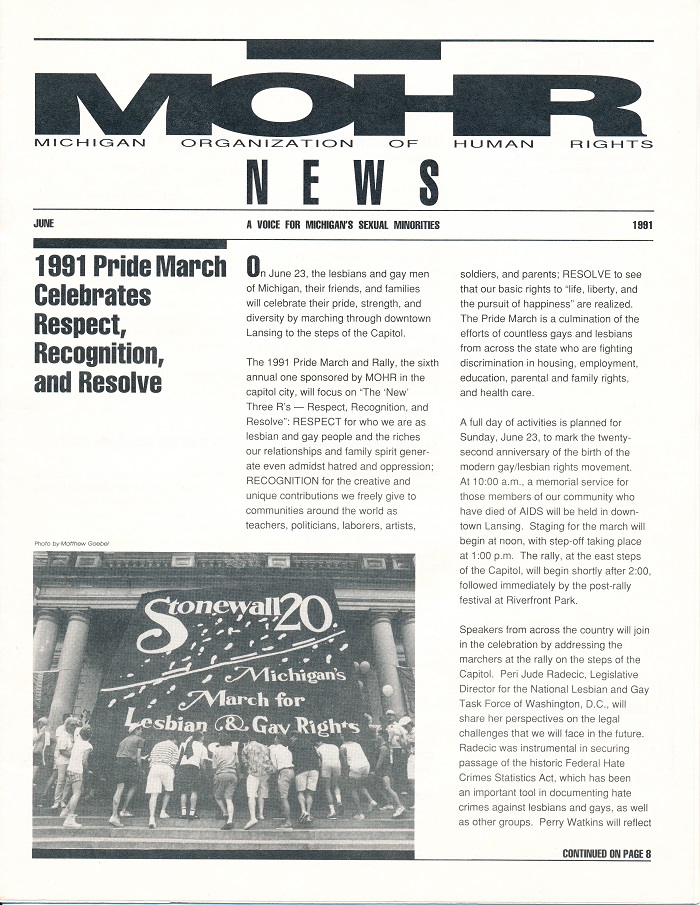
The Michigan Organization for Human Rights was an early initiative to advocate for civil rights and anti-discrimination policies. It was formed in 1977 and disbanded in 1994. Its work has been taken up by Affirmations and the Triangle Foundation.
Gaylor collection holdings: MOHR Information (July 1981) and MOHR News (June 1981)
PFLAG (Parents, Family and Friends of Lesbians and Gays)
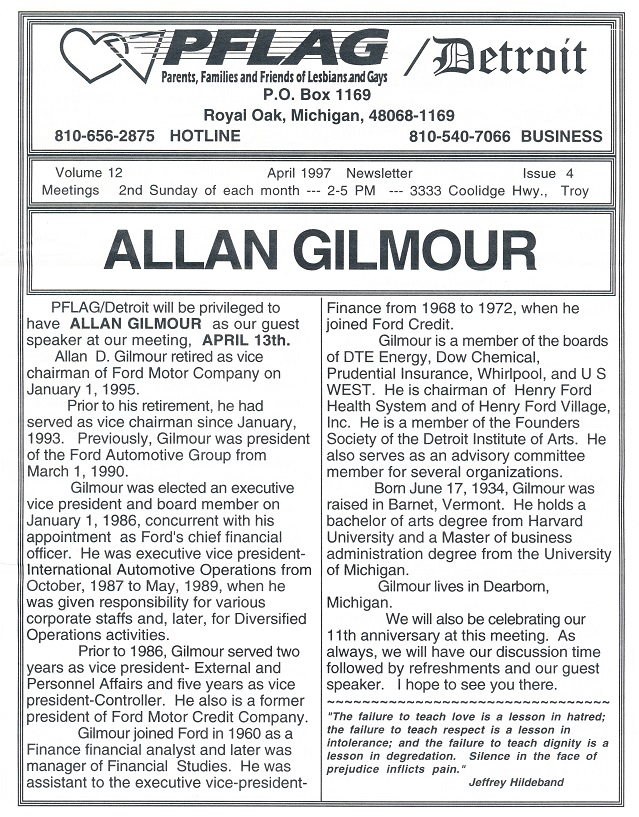
A chapter of the national organization, Parents, Family and Friends of Lesbians and Gays Detroit was founded in 1987 when Detroit area parents of children who were gay thought that society had it all wrong and sought to create a community. This organization combats hate towards their loved ones and provides resources to help parents understand how to be supportive of their children.
Gaylor collection holdings: Spring 1995, September-October 1996, March and April 1997
Affirmations
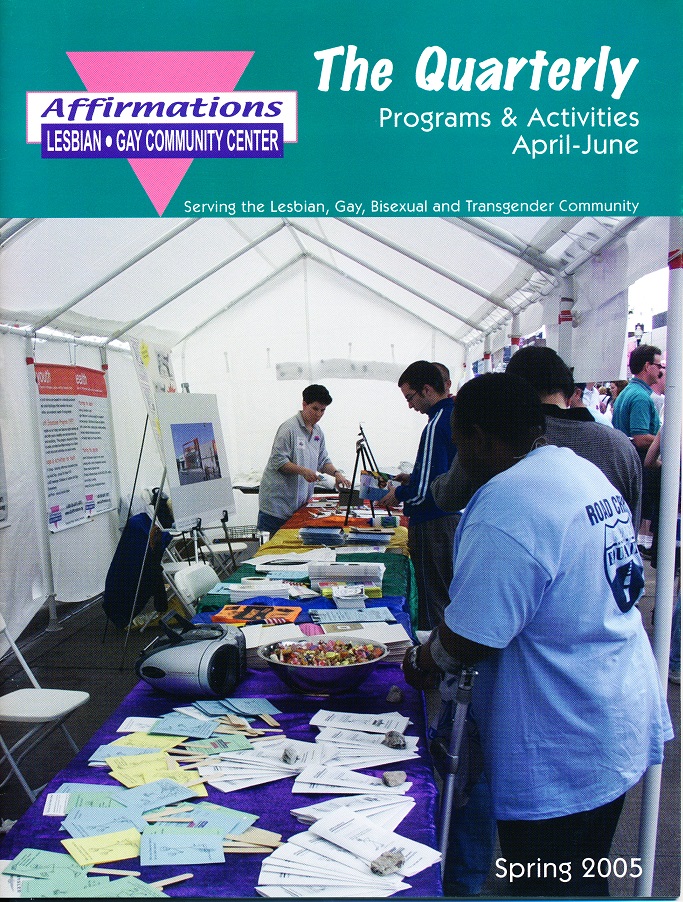
Affirmations was founded in 1989. It is a LGBT community center currently located in Ferndale, MI. The center was originally housed in a building owned by MOHR. The organization moved into their current building on West 9 Mile Road in 2007. They provide resources regarding LGBT events and job skills as well as counseling and health related information. They facilitate a variety of support groups for people of all sexualities, gender identities and expressions. In their own words, this organization is supportive and unconditionally accepting.
Gaylor collection holdings: Affirmations: The Quarterly (spring and summer 2005); first issue of Galaxie, a course catalog.
The Triangle Foundation
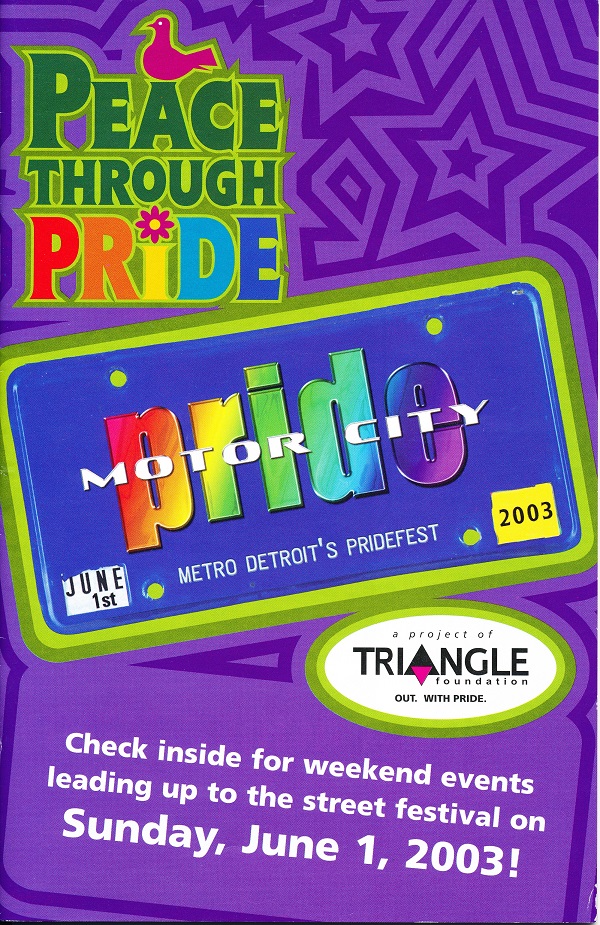 The Triangle Foundation was formed in 1991 to combat hate crime and discrimination against LGBT individuals. This organization actively worked to advocate for policy change and to combat anti-LGBT legislation. They produced events such as Motor City Pride and Michigan Pride March. Their quarterly newsletter was a source of LGBT political and legislative news. The Triangle Foundation merged with Michigan Equality in 2010 (another LGBT legislative activist organization) to form Equality Michigan which still hosts Motor City Pride every year.
The Triangle Foundation was formed in 1991 to combat hate crime and discrimination against LGBT individuals. This organization actively worked to advocate for policy change and to combat anti-LGBT legislation. They produced events such as Motor City Pride and Michigan Pride March. Their quarterly newsletter was a source of LGBT political and legislative news. The Triangle Foundation merged with Michigan Equality in 2010 (another LGBT legislative activist organization) to form Equality Michigan which still hosts Motor City Pride every year.
Gaylor collection holdings: Triangle Foundation Quarterly Newsletter ( Fall 2000); the Tripod report to investors ( January and Fall 1996).
Unified: HIV Health and Beyond
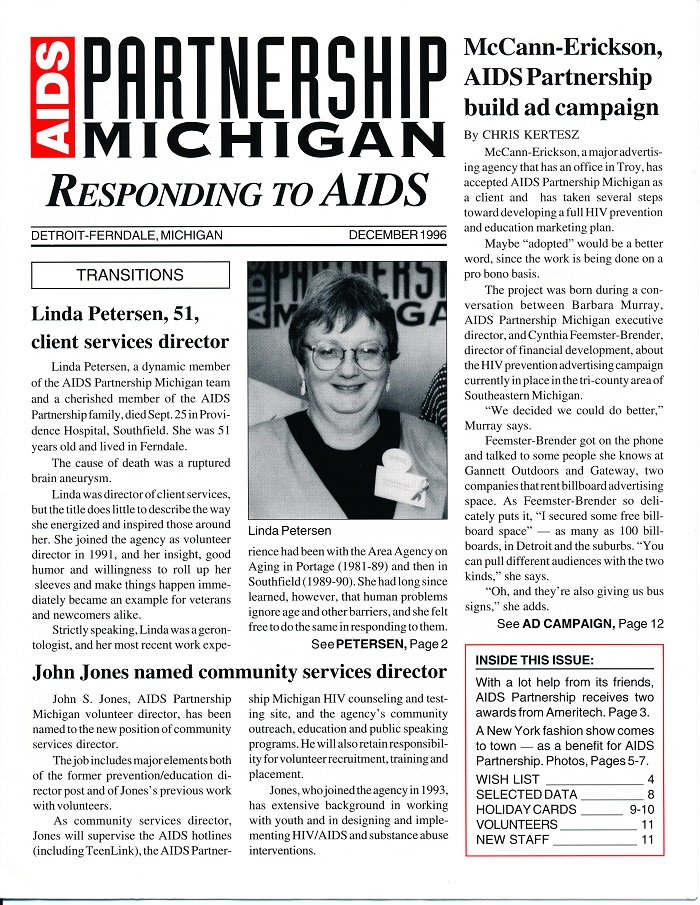
AIDS Partnership of Michigan and HIV/AIDS Resource Center merged in 2015 to form Unified: HIV Health and Beyond. This organization provides HIV services including care, prevention resources and outreach to the ten counties in Southeastern Michigan.
Gaylor collection holdings: monthly newsletter for AIDS Partnership of Michigan (1996, 1999 and 2000)
The First Commencement
In Spring 1963 the first students graduated.
MSU-O was now Oakland University, but was still attached to MSU.
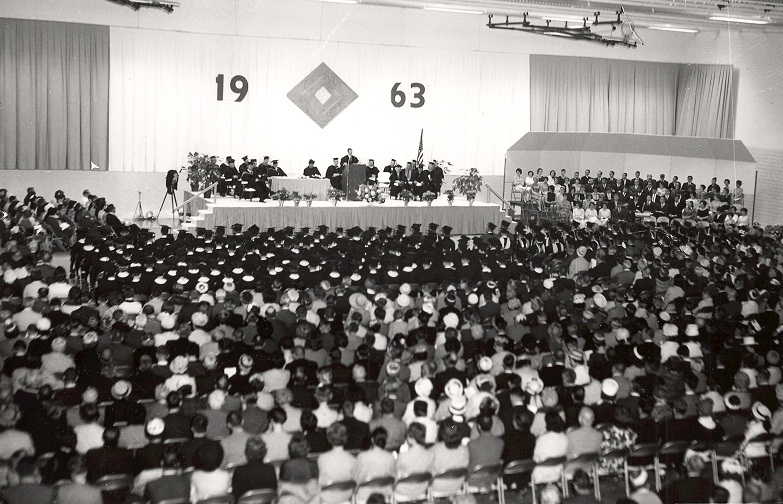
At the commencement ceremony on April 20, 1963, 146 degrees were conferred.
Matilda Wilson was presented with an honorary degree.1
At the senior dance, organized at Meadow Brook Hall, Mrs Wilson gave each student a gold class ring set with a diamond and bearing the legend "Oakland University Charter Class."
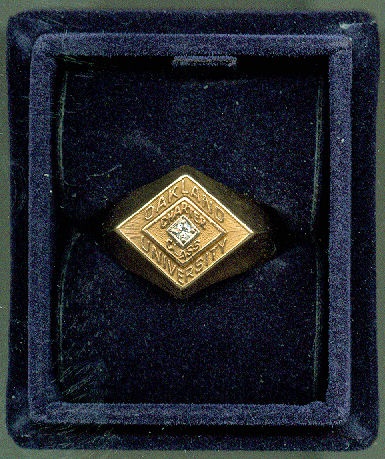
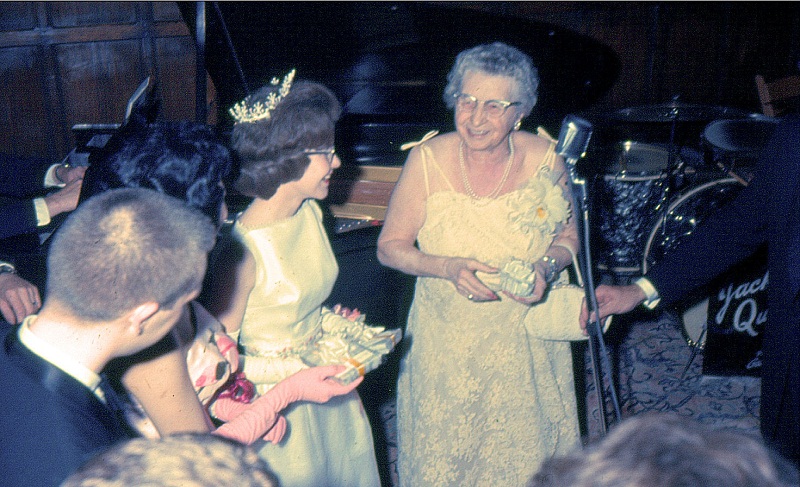
By then Oakland University had changed. The faculty had modified the original curriculum – adding new disciplines like sociology and the arts. The percentage of general education was reduced, and would continue to decrease. Enrollment was growing.2
"We can't be all things,but whatever we do, we ought to do well." -- Woody Varner3
---
Notes
1. Program, Oakland University Charter Class Commencement, April 20, 1963.
2. "Promise, Dedication, Camaraderie and Hard Work: OU Charter Faculty and Staff Look Back on 25 Years," Oakland University Magazine, Summer 1984, p. 4,
3. Interview with Robert W. Swanson, The Oakland University Chronicles (1997), p. 18.
In providing access to its collections, the Oakland University Archives and Special Collections acts in good faith. Despite the safeguards in place, we recognize that mistakes can happen. If you find on our website or in a physical exhibit material that infringes on an individual’s privacy, please contact us in writing to request the removal of the material. Upon receipt of valid complaints, we will temporarily remove the material pending an agreed solution.




